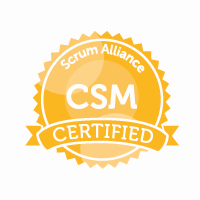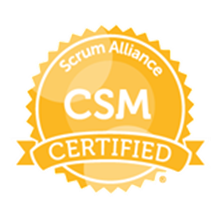IT01A18: CERTIFIED SCRUM MASTER (CSM) (SF) (SYNCHRONOUS E-LEARNING)

CERTIFIED SCRUM MASTER (CSM) (SF) (SYNCHRONOUS E-LEARNING)
Course Duration
Mode of Assessment
Written Assessment (Short Answer Question and Case Study)
Who Should Attend
Traditional project and program managers who would like to understand and adopt Scrum methodology, Individuals with project management knowledge and experience aiming to achieve globally recognised Certified Scrum Master (CSM) certification from Scrum Alliance, Individuals who aspire to be Scrum Masters, Individuals who would like to understand Scrum methodology to pursue a role in project management.
Course Overview

NTUC LearningHub Course Code: IT01A18
This is a two-day course designed to help you understand how to solve complex problems using Scrum, one of the most popular Agile methodologies. With hands-on learning and expert sharing from our highly experienced Certified Scrum trainers, students will understand Agile and Scrum methodology, the role and responsibilities of a Scrum Master, how to coach and facilitate teams, and how to practice and embody Scrum values. This course will also prepare a learner to take the Certified Scrum Master exam from Scrum Alliance, which is widely recognised throughout the world.
Course Schedule
Next available schedule
Course Objectives
At the end of this course, participants will be able to:
- Understand what is Agile, Agile Values, Principles and World view
- Understand how Agile promotes empirical process
- Know about product contexts and understand which Agile frameworks/methods are most applicable where and why
- Understand how Agile can enable organization as a System to change successfully?
- Understand how facilitation plays a role in bringing about successful transformation and how it drives agility
- Know how to measure organizational change using KPIs
- Know how to identify and resolve impediments that enables teams and organizations to be Agile
- Know how to measure team’s capability and use it for forecasting
Pre-requisites
- Be able to speak, listen, read and write English at a proficiency level equivalent to the Employability Skills Workforce Skills Qualification (ES WSQ) Workplace Literacy (WPL) Level 6
- Well versed in Microsoft Office applications, especially Word
- Hardware & Software
This course will be conducted as a Virtual Live Class (VLC) via Zoom platform. Participants must own a zoom account and have a laptop or a desktop with “Zoom Client for Meetings” installed. This can be downloaded from https://zoom.us/download
|
System Requirement |
|
Must Have: Please ensure that your computer or laptop meets the following requirements.
Good to Have:
Not Recommended: |
Course Outline
Pre-workshop:
We want the students to make most of the time they spend with our trainers and other students. Learning maximizes with the perspective of others. So students need to go through online articles and videos to prepare for the workshop. The online material includes:
- Learn Agile Manifesto
- Learn basic Scrum Framework
- Go through Scrum Guide
- Learn about the CSM test process
Workshop:
The workshop designed to help you learn everything you need to do as a Scrum Master from day 1 of your job. You will be learning the role of Scrum Master through role plays and by doing. The whole course is split into 4 Sprints with each Sprint focusing on the following topics:
Sprint 1: Why do we need Scrum and ScrumMaster?
The goal of this Sprint is to understand why do Organizations need Scrum and why do they hire ScrumMaster.
- Mental Model
- What is Mental Model?
- How are they formed?
- How do mental models change?
- Why is it important for ScrumMaster to understand Mental Models?
- Incremental Delivery
- What is the Cost of Delay(CoD) and Cost of Production (CoP)?
- What are the factors that cause CoD and CoP?
- How do CoD and CoP impact ROI of Organization?
- How Scrum helps in improving ROI by reducing CoD and CoP?
- Agile & Empirical Process
- What is Agile and Empirical Process?
- Why are the various ways to be Agile?
- How to decide what process is good for my product?
Sprint 2: How to introduce Scrum in an Organization?
The goal of this Sprint is to explore ScrumMaster’s role in helping the Organization adopt Scrum.
- ScrumMaster as a Systems Thinker
- What is a System and why Organizations are a System?
- What is Systems Thinking?
- Why is it important for ScrumMaster?
- How to develop Systems Thinking?
- ScrumMaster as a Change Agent
- How to create a shared need for change?
- Explore the underlying reasons behind Organizations adopting Scrum and how to measure progress?
- How to identify various stakeholders required to support adoption?
- How to identify what are the structural/policy/process changes required to adopt Scrum?
- What are the different techniques to facilitate change?
- ScrumMaster as a Facilitator
- What is facilitation – Basic vs Developmental facilitation?
- Different facilitation techniques – Advocacy vs Inquiry
- What are the different focus areas of ScrumMaster
- How does ScrumMaster’s role change over a period of time?
Sprint 3: Coaching Product Owner to build Product in increments.
The goal of this Sprint is to explore ScrumMasters role in coaching Product Owner to deliver Product in increments. In the process, students will understand everything to be done to get started with the first Sprint.
- Forming Scrum Team
- What are the responsibilities of Scrum roles?
- What are the skills required to play Scrum roles?
- How to transform your teams into Scrum teams?
- What are the practical difficulties in forming Scrum teams and how to overcome them – Distribution and Scaling?
- Class Project
- Identify a product to work on
- Identify roles
- Understand Product vision.
- Building Product Backlog
- What is vertical split vs horizontal split?
- What are the various techniques to Split Product Backlog Items(PBIs)?
- What is ScrumMaster’s role in teaching the PO about splitting techniques and building Product Backlog?
- Practice splitting techniques on a class project.
- Identifying MVP
- Why is it not possible to fix things upfront for complex projects?
- What is Technical Debt and how fixing things upfront and focusing on estimation causes Technical Debt?
- How to overcome Technical Debt?
- Why is it good to focus on value delivery instead of fixing the estimation problem?
- What is MVP?
- How ScrumMaster can help the PO identify MVP?
- Apply Story Mapping on a class project to identify MVP.
Sprint 4: Coaching teams to become learning teams.
The goal of this Sprint is to explore Scrum Masters role in coaching Development Team to become learning teams. The students run a couple of Sprints on the class project to understand Scrum end to end.
- Release Planning
- What is a Release?
- What is relative estimation and #NoEstimates?
- How do we forecast a release date?
- Why release plan is not cast in stone and release planning should be iterative?
- Refining Product Backlog
- What is Backlog Refinement?
- What are the helpful practices for Backlog Refinement?
- Refine the Product Backlog of the Class Project.
- Sprint Simulation
- Run couple of Sprints for the class project.
- Simulate and discuss issues that a team may face during Sprint and learn how ScrumMaster can help the team.
Certificate Obtained and Conferred by
- Certificate of Completion from NTUC LearningHub
Upon meeting at least 75% attendance and passing the assessment(s), participants will receive a Certificate of Completion from NTUC LearningHub.
- External Certification Exam
After completing the course with 100% attendance achieved, students will receive an exam voucher via email within 2 weeks from the date of course completion from Scrum Alliance. Subsequently, students can proceed to register and sit for the official “Certified Scrum Master” exam on Scrum Alliance online portal.
Upon receiving the exam voucher, you must complete the exam within 90 days.
Upon passing the official “Certified Scrum Master” certification exam, candidates will receive the Certified Scrum Master certification from Scrum Alliance. The certification is governed and maintained by Scrum Alliance.
Certified Scrum Master Exam Details
No. of Questions: 50
Question Format: Multiple-choice
Exam Duration: 60 minutes
Passing Score: 37 out of 50 (74%)
Additional Details
Medium of Instruction: English
Trainer: Trainee Ratio is 1:20
Mode of Delivery: Online Instructor-Led Training via VLC
Courseware: Canvas
Lab: NA
Price
|
Course Fee and Government Subsidies |
||||||
|
|
Individual Sponsored |
Company Sponsored |
||||
|
|
Non-SME |
SME |
||||
|
Before GST |
With GST |
Before GST |
With GST |
Before GST |
With GST |
|
|
Full Course Fee
|
$1,800.00 |
$1,962.00 |
$1,800.00 |
$1,962.00 |
$1,800.00 |
$1,962.00 |
|
For Singapore Citizens aged 39 years and below
|
$540.00 |
$588.60 |
$540.00 |
$588.60 |
$180.00 |
$228.60 |
|
For Singapore Citizens aged 40 years and above |
$180.00 |
$228.60 |
$180.00 |
$228.60 |
$180.00 |
$228.60 |
Funding Eligibility Criteria:
|
Individual Sponsored Trainee |
Company Sponsored Trainee |
|
|
Remarks:
|
Individual Sponsored Trainee |
Company Sponsored Trainee |
|
SkillsFuture Credit:
UTAP:
PSEA:
|
Absentee Payroll (AP) Funding:
|
Terms & Conditions apply. NTUC LearningHub reserve the right to make changes or improvements to any of the products described in this document without prior notice.
Prices are subject to other LHUB miscellaneous fees.
| Batch ID | Course Period | Course Title | Funding Available |
Duration (Hours) |
Session (Hours) |
Venue | Available Seats |
Online Payment |
|---|
What Others Also Enrolled In

CERTIFIED SCRUM MASTER (CSM) (SF) (SYNCHRONOUS E-LEARNING)
View detail
CERTIFIED SCRUM PRODUCT OWNER (CSPO) (SF) (SYNCHRONOUS E-LEARNING)
View detail
